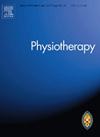A cardiac rehabilitation programme based on neuromuscular training improves the functional capacity of patients with acute coronary syndrome: a preliminary randomised controlled trial
IF 3.1
3区 医学
Q1 REHABILITATION
引用次数: 0
Abstract
Objectives
To evaluate the effects of a cardiac rehabilitation programme based on neuromuscular training (NMT) compared with classic rehabilitation strength training (CRST) in patients diagnosed with acute coronary syndrome (ACS).
Design
Preliminary randomised, double-blinded, parallel clinical trial.
Setting
University health clinic in Valencia, Spain.
Participants
Thirty patients with ACS.
Interventions
Patients were assigned to one of two groups at random: the NMT group (n = 15) and the CRST group (n = 15). All patients attended the 20 sessions of the exercise programme.
Main outcome measures
The primary outcome was the Incremental Shuttle Walk Test (ISWT). The secondary outcomes were the Chester Step Test (CST), the 30-Second Chair Stand Test (30CST), and hip flexor dynamometry. Assessments were made at baseline, immediately post-treatment, and at 6-month follow-up.
Results
The NMT group showed a greater improvement in the ISWT than the CRST group, both at post-treatment {mean 648 [standard deviation (SD) 197] vs 493 (SD 219), mean difference 155, 95% confidence interval (CI) −1 to 310} and at follow-up [732 (SD 183) vs 518 (SD 222), mean difference 214, 95% CI 61 to 367]. The secondary outcomes showed significant between-group differences in favour of the NMT group at 6-month follow-up, except for the 30CST.
Conclusions
These preliminary findings indicate that a cardiac rehabilitation programme based on NMT may improve functional capacity in terms of patient performance, cardiorespiratory fitness and muscle strength. Moreover, the improvements were maintained at medium-term follow-up. This could help improve the design of rehabilitation sessions, considering factors associated with performing everyday activities in patients affected by ACS.
Clinical Trial Registration number
NCT04246008.
Contribution of the Paper
- •This study provides insight into new modalities of strength interventions in patients with acute coronary syndrome.
- •Neuromuscular training is a novel exercise modality in cardiac rehabilitation patients that has been shown to improve functional capacity.
基于神经肌肉训练的心脏康复计划可提高急性冠状动脉综合征患者的功能能力:一项初步随机对照试验。
目的评估基于神经肌肉训练(NMT)的心脏康复计划与传统康复力量训练(CRST)对急性冠状动脉综合征(ACS)患者的影响:初步随机、双盲、平行临床试验:参与者:30 名急性冠状动脉综合征(ACS)患者:30名急性冠状动脉综合征(ACS)患者:患者被随机分配到两组中的一组:NMT 组(15 人)和 CRST 组(15 人)。所有患者都参加了 20 次锻炼计划:主要结果为增量穿梭步行测试(ISWT)。次要结果为切斯特台阶试验(CST)、30 秒椅子站立试验(30CST)和髋屈肌测力法。评估分别在基线、治疗后即刻和 6 个月随访时进行:结果:在治疗后{平均值648[标准差(SD)197] vs 493 (SD 219),平均差155,95%置信区间(CI)-1至310}和随访时[732 (SD 183) vs 518 (SD 222),平均差214,95%置信区间(CI)61至367],NMT组的ISWT改善幅度均大于CRST组。除 30CST 外,6 个月随访的次要结果显示,NMT 组的组间差异明显:这些初步研究结果表明,以 NMT 为基础的心脏康复计划可以提高患者在表现、心肺功能和肌肉力量方面的功能能力。此外,这些改善在中期随访中得以保持。临床试验注册号:NCT04246008:临床试验注册号:NCT04246008。论文贡献
本文章由计算机程序翻译,如有差异,请以英文原文为准。
求助全文
约1分钟内获得全文
求助全文
来源期刊

Physiotherapy
医学-康复医学
CiteScore
6.40
自引率
3.00%
发文量
377
审稿时长
82 days
期刊介绍:
Physiotherapy aims to publish original research and facilitate continuing professional development for physiotherapists and other health professions worldwide. Dedicated to the advancement of physiotherapy through publication of research and scholarly work concerned with, but not limited to, its scientific basis and clinical application, education of practitioners, management of services and policy.
We are pleased to receive articles reporting original scientific research, systematic reviews or meta-analyses, theoretical or debate articles, brief reports and technical reports. All papers should demonstrate methodological rigour.
 求助内容:
求助内容: 应助结果提醒方式:
应助结果提醒方式:


